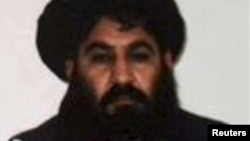There have long been rumors of rifts among the Afghan Taliban. But the death of Mullah Omar, the Taliban’s reclusive chief, has made those divisions public.
Mullah Mansoor had hardly settled into his job as the Taliban’s new chief when Mullah Abdul Manan, a brother of Mullah Omar, voiced opposition to Mansoor’s appointment.
Along with Mullah Omar’s family, close aides of the late Taliban leader have contested Mansoor’s succession, as has Mullah Tayyab Agha, who headed the Taliban office in Qatar until he announced his resignation Monday.
Tayyab Agha's resignation is likely to frustrate the Islamabad-based Afghan negotiations. Representatives from the Afghan government and Taliban had held an initial round of face-to-face talks in Pakistan in July. A second round was abandoned after Mullah Omar’s death was confirmed by the Taliban.
“Tayyab Agha is a big name in the Taliban ranks, and he was close to Mullah Omar,” Rahimullah Yousafzai, a senior Pakistani journalist who has written extensively on the Taliban, told the VOA Deewa service. Agha’s “resignation will certainly put more pressure on Mullah Mansoor,” Yousafzai said. He added that Agha’s departure not only jeopardizes the precarious Afghan peace process but also widens the intra-Taliban division.
A senior Taliban leader has admitted to The Wall Street Journal that after Mullah Omar’s death, a tug-of-war among senior leaders set in. “A power struggle has emerged within Afghanistan’s Taliban following the death of their supreme commander,” the Journal quoted the unidentified Taliban figure as saying.
Defections to Islamic State
Wrangling within the leadership at the top could open the way for disgruntled Taliban foot soldiers to embrace the Islamic State group, which is already believed to have established itself in Afghanistan.
“I suspect the widening cracks in the ranks of Taliban risks defections to the Islamic State in Afghanistan,” former U.S. Ambassador to Pakistan William B. Milam told VOA Deewa in an interview.
The death of a former Taliban leader thought to be an IS commander in a U.S. drone strike in July gave credence to reports that many Taliban commanders had changed their loyalties by joining IS. According to the Afghanistan National Directorate of Security, former Taliban leader Hafiz Saeed was killed along with 30 other insurgents in a strike on their compound in the Achin region of Nangarhar province.
Pakistan peace efforts
Pakistan has kept silent regarding Mullah Omar’s death. That has prompted the chairman of the Pakistani Senate, the upper house of Parliament, to demand that Prime Minister Nawaz Sharif’s government make its position known on the Taliban leadership as well as the Afghan-Taliban talks.
Pakistan’s military chief, General Raheel Sharif, held a meeting with top commanders after Mullah Omar’s death. In the meeting, he reportedly said the way to peace in Afghanistan was through negotiations. Sharif said nothing publicly about Mullah Omar’s death.
If Mullah Mansoor continues to lead the Taliban, Pakistan will continue to hold its long-standing influence over the militia, Ahamd Majidyar, of the Washington-based American Enterprise Institute, told VOA Deewa.
Majidyar said Mullah Mansoor belongs to the generation of Taliban that had links with Pakistan through its ISI intelligence service. “It seems Pakistan has influence over Mullah Mansoor,” he said. The Taliban shura council, which appointed Mullah Mansoor, met in Baluchistan, which might not have happened without Pakistan’s knowledge, he said.
Some experts believe that a pro-Pakistan Taliban leader puts Islamabad in a win-win situation. Pakistan hopes to reduce U.S. and Afghan pressure on it by facilitating peace talks between the Afghan government and the Taliban. Mullah Mansoor's selection will also offer an opportunity for Pakistan to continue its role as a major player in Afghan politics.
However, the process of peace can be delayed indefinitely if a majority of Taliban commanders and council members rebel against Mullah Mansoor's leadership.




